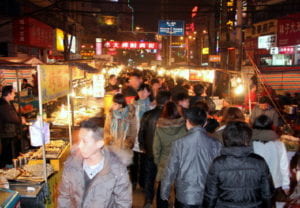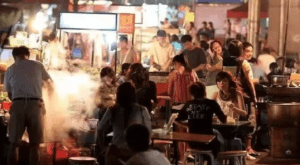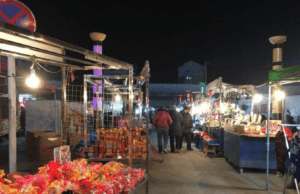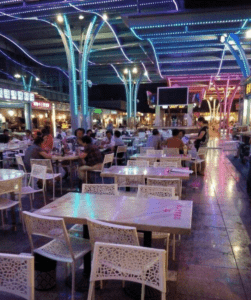In the most prosperous center of Zhenjiang City, there is a very interesting path. In the last century before the 1980s, it was a small alley, but the name is called Nanmenda Street (“da” means big and wide in Chinese). In the middle of the 1980s, after widening the alley, it finally become a road that could allow 2 cars pass together.

In those 20 years, as soon as the night falls, this street will boil up. Because of the low rent, lots of migrant and local people choose this place the start their small business. Folk snacks, daily provisions, cultural supplies, various kinds of stalls densely cluster together. There would be Beijing sugared gourd shop whose owner is from Anhui Province, Doner Kebab shop whose owner is from Shandong Province…… This is a hodgepodge of migrant and local people. In the tide of people, shouting, bargaining voices can be heard, lively and extraordinary.

This street carried the memories of many people. It could be the witness of love of many college students at that time since lots of things are quite a bargain there. It also fulfilled the entrepreneurial dream of shop owners there and gave so many people a happy life.
However, on February 28, 2013, all this came to an end.
Due to its location in the bustling downtown area, Nanmenda Street Night Market is often complained about affecting traffic and the lives of surrounding residents at night. Eventually, the night market was moved to Huangshan Road, not far from the railway station. It was supposed to be a new night market hub, but the development is not as good as the local government expected.


Lots of local people lost their sense of moral ownership of this street. The street was replaced by a square, in order to be more organized. Food stores and the grocery stores were separated into different sections to make this market become cleaner. However, it was the worldly atmosphere (“烟火气”in Chinese ) that attracted people to go to the night market. When the local shopping street is genetically modified, it could not survive in the original ecosystem.
Lots of the vendors blamed the local government for lying to them, since local government used the lower rent, larger space and more convenient traffic to attract them. Though it seemed very promising at the beginning, the vendors were the ones who actually suffer from the hoax of the city rebuilding. Less than a fifth of the original shops are still alive, but many are barely surviving. Technology shifted many kinds of consumption away from human interaction in brick-and-mortar shops. People would prefer larger choice and require more geographical mobility. Lots of the vendors could not find another way of living and are trapped in that square.
At present, when it comes to the night market, many People in Zhenjiang may have the nostalgic plots of Nanmenda Street. However, if the Nanmenda Street was reconstructed, less local people would like to be there, because most of them have accustomed to the new style of living changed by technology.
Leave a Reply